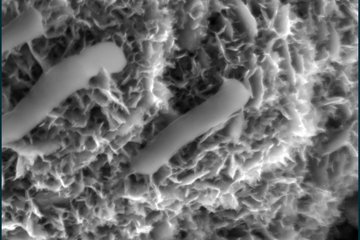All genres
1.
Journal Article
Materials Design by Constructing Phase Diagrams for Defects. Advanced Materials 37 (3), 2402191 (2025)
2.
Journal Article
Interfacial segregation of carbon atoms: the competition between grain boundaries and phase boundaries. Scripta Materialia 268, 116842 (2025)
3.
Journal Article
A python workflow definition for computational materials design. Digital Discovery 4, pp. 3149 - 3161 (2025)
4.
Journal Article
Boron triggers grain boundary structural transformation in steel. Nature Communications 16 (1), 6927 (2025)
5.
Journal Article
Magnetism in iron alloys: methodological advances for thermodynamics, defects, and kinetics. International Journal of Materials Research 116 (6), pp. 474 - 525 (2025)
6.
Journal Article
Management of reference data in materials science and engineering exemplified for creep data of a singlecrystalline Nibased superalloy. Acta Materialia 286, 120735 (2025)
7.
Journal Article
Automated optimization and uncertainty quantification of convergence parameters in plane wave density functional theory calculations. npj Computational Materials 10 (1), 263 (2024)
8.
Journal Article
Metastable defect phase diagrams as roadmap to tailor chemically driven defect formation. Acta Materialia 277, 120145 (2024)
9.
Journal Article
mamonca: magnetic Monte Carlo code. The Journal of Open Source Software (JOSS) 9 (100), 6194 (2024)
10.
Journal Article
The effect of Laves phases and nano-precipitates on the electrochemical corrosion resistance of Mg–Al–Ca alloys under alkaline conditions. Journal of Magnesium and Alloys 12 (6), pp. 2447 - 2461 (2024)
11.
Journal Article
Effect of Sn on stacking fault energies in zirconium and its hydrides. Physical Review Materials 8 (3), 033605 (2024)
12.
Journal Article
Melting properties of the refractory metals V and W and the binary VW alloy fully from first principles. Physical Review B 109, 094110 (2024)
13.
Journal Article
Diffusion-controlled growth and microstructural evolution between Pt and Pd containing B2-NiAl bondcoats and Ni-based single crystal superalloy. Acta Materialia 266, 119687 (2024)
14.
Journal Article
Corrigendum to "Diffusion-controlled growth and microstructural evolution between Pt and Pd containing B2-NiAl bond coats and Ni-based single crystal superalloy" (vol 266, 119687, 2024). Acta Materialia 277, 120219 (2024)
15.
Journal Article
Giant segregation transition as origin of liquid metal embrittlement in the Fe-Zn system. Scripta Materialia 238, 115758 (2024)
16.
Journal Article
Tailoring negative pressure by crystal defects: Microcrack induced hydride formation in Al alloys. Physical Review Materials 7, 105401 (2023)
17.
Journal Article
Quantification of electronic and magnetoelastic mechanisms of first-order magnetic phase transitions from first principles: application to caloric effects in La(FexSi1−x)13. Journal of Physics: Energy 5 (3), 034004 (2023)
18.
Journal Article
Coherent twin-oriented Al3Sc-based precipitates in Al matrix. Scripta Materialia 229, 115351 (2023)
19.
Journal Article
Influence of spin fluctuations on structural phase transitions of iron. Physical Review B 107 (10), 104108 (2023)
20.
Journal Article
Combined ab initio and experimental screening of phase stabilities in the Ce–Fe–Ti–X system (X=3d and 4d metals). Physical Review Materials 7 (1), 014410 (2023)











